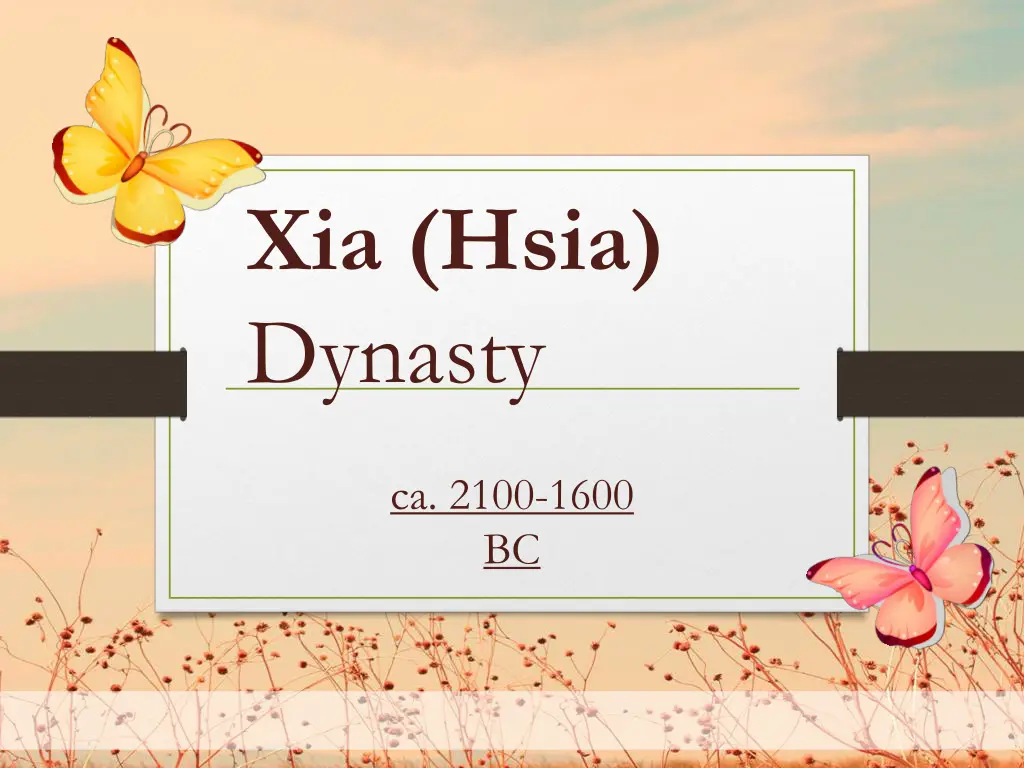
Ancient Xia Dynasty of China: Facts and Legends Unveiled
Explore the historical accounts and mythological tales surrounding the Xia Dynasty of China, which is considered the first dynasty in Chinese history. Discover the reign of emperors, significant events like the legendary story of Yu the Great stopping floods, and the eventual decline of the Xia Dynasty under the rule of Kong Jie. Unveil the ancient practices, rituals, and beliefs, including ancestor veneration, that shaped the early civilization of China during the Xia Dynasty era.
Download Presentation

Please find below an Image/Link to download the presentation.
The content on the website is provided AS IS for your information and personal use only. It may not be sold, licensed, or shared on other websites without obtaining consent from the author. If you encounter any issues during the download, it is possible that the publisher has removed the file from their server.
You are allowed to download the files provided on this website for personal or commercial use, subject to the condition that they are used lawfully. All files are the property of their respective owners.
The content on the website is provided AS IS for your information and personal use only. It may not be sold, licensed, or shared on other websites without obtaining consent from the author.
E N D
Presentation Transcript
Xia (Hsia) Dynasty ca. 2100-1600 BC
Xia dynasty was real or a myth? Xia dynasty is the first dynasty of China. It was founded in 2100 BC and ended in 1600 BC.
Huan Di (2698 BC) Yao Shun Yu the Great (2032 2025 BC)
Emperors of Emperors of the the Xia dynasty Xia dynasty Order Chinese name Pinyin Reign Notes Y 1 45 Yu the Great. Stop the problem with floods. Q 2 10 Yu s son. Established the hereditary system. 3 4 5 6 Tai Kang Zh ng K ng Xi ng Sh o K ng 29 13 28 21 Posthumous child of Xiang. Reportedly founded "ancestor worship," later the official religion of China. 7 8 9 10 11 12 13 14 15 16 17 Zh Hu i M ng Xi B Ji ng Ji ng J n K ng Ji G o F Ji 17 26 18 16 59 21 21 31 11 11 52 Son of Mang Also Lu Gui ( , L Gu ). His tyrannical rule brought about the end of the dynasty. 4
Why Yu became an emperor? Stop floods; Measured 9 rivers and 9 chains of mountains; Divided the country into 9 provinces; Each province had its own tribute. They pay a tribute according to output. 5
Yu the Great's attempt to stop the floods Yu was highly trusted by Shun, so Shun appointed him to finish his father s work, which was to stop the flooding. Yu s method was different from his father s: he organized people from different tribes and ordered them to help him build canals in all the major rivers that were flooding and lead the water out to the sea. Yu was dedicated to his work. People praised his perseverance and were inspired, so much so that other tribes joined in the work. Legend says that in the 13 years it took him to successfully complete the work to stop the floods, he never went back to his home village to stop and rest, even though he passed by his house three times.
Ancestor veneration is a religion He gave acres to feudatory tribes in hereditary tenancy!
The beginning of an end! The 14themperor Kong Jie was very superstitious. He practiced magic and divination, esteemed spherical spirits. In affairs he was disorderly. The end on the Xia Dynasty! Kong Jie (1728 1675 BC) was the 17th and last ruler of the Xia dynasty of China. He is traditionally regarded as a tyrant and oppressor who brought about the collapse of a dynasty. Around 1600 BC, Jie was defeated by Shang Tang, bringing an end to the Xia Dynasty that lasted about 500 years, and a rise to the new Shang Dynasty.
Kong Jie with a halberd, representing oppression, and sitting on two ladies, symbolizing his abuse of power. Rubbing of a relief from a Wu family shrine, Jiaxiang, Shandong.
Conclusions Xia dynasty is the first dynasty of China. It was founded in 2100 BC and ended in 1600 BC. Historians have have concluded that most of the population of the Xia Dynasty lived in the western Henan Provice and the southern Shanxi Province. This dynasty transformed China from a primitive society to a class society. Yu the Great set up the original Xia Dynasty under the system of abdication, which focused on the abilities of a ruler. His son, Qi, succeeded him and from that point forward, the throne was given to members of his families under a system of heredity, thereby rewarding the title of emperor based on family ties. After his death, Qi was succeeded by 15 of his offspring. At the time the Xia reign was in place, people were mostly farmers and used tools made of bone or stone. Horse breeding, livestock, and the production of crops received much attention and these areas were greatly improved upon. Legend has it that winemaking was also attempted during this period. Although it was likely primitive in nature, vehicular transport did exist; however, not much is known about the types of carriages or rickshaws that were used.
